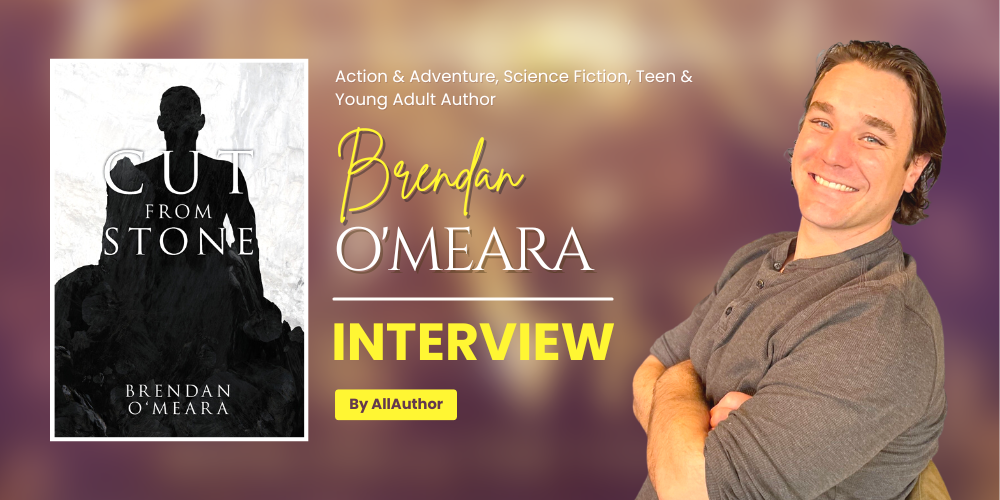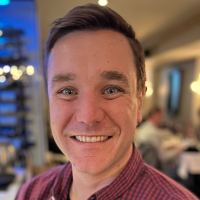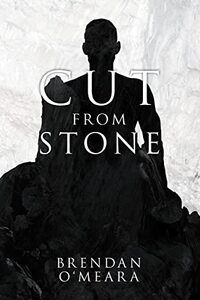Brendan O'Meara Interview Published on: 02, Aug 2023
 What was your childhood like? Tell us your fondest memory.
What was your childhood like? Tell us your fondest memory.
I think my favorite memory is July 4th when I was a kid at my extended families house. Fireworks, hot dogs, brats, burgers, and very little adult supervision made for a really fun time.
As an avid reader, you have a specific interest in various genres, including sci-fi, dystopian, fantasy, history, and fiction. How have these genres influenced your writing, and do you incorporate elements from them into your work?They definitely influenced my writing, but I would say I incorporate historic events and elements of history when I write. This ranges from classic relationships between countries questioned in stories I write to pulling in suspected theories from historic events as a basis for a story I'm writing. When it comes to fiction writing I don't love to pull in any specific elements from other writers, but I certainly see what they do and try to adapt their writing in an approach I can call my own.
Can you tell us more about your journey as a writer? How did your love of stories and books in your early years lead you to become an author?I think I learned how to read later than anyone else in my elementary school class, but by the time I was in fifth grade I was moving onto classics like To Kill a Mockingbird and reading The Perfect Storm on an annual basis. I dove into every series I could find and went on long stretches with specific genres reading classic crime written by everyone from Dick Francis to Sir Arthur Conan Doyle or jumped into a long period of RL Stein Goosebump books. After all that reading and the inability to easily fall asleep at night writing my own stories came naturally. I started writing them down when I was in college and the rest is history.
While attending college in Philadelphia, you were daydreaming about a dystopian reality. How did this daydreaming process influence your novel's development and your storytelling approach?Daydreaming allowed my to switch paths in my story, find different characters in the real world, identify settings for the story, and build my world without writing everything down. This gave me the sense of an easy to change and alter world and provided an almost research-like experience to my writing fiction.
Your debut novel, "Cut From Stone," is the first book in the Crafting Humanity series. What inspired the story and the concept behind this series?I wanted to write a cool, massive scope story that explored characters more than plot. I love the plot I'm writing, but nothing happens unless the characters are active. However, there normally needs to be a character that gets exploited by their faults and ends up being less relatable than an author might think. Every major character was flawed before the series or the book started and I wanted a character that grew with their story. So it was less about a specific event or moment that inspired me to write, but the fact that I wasn't reading a ton of books that had characters that took the long road to find their flaws.
Your middle school teachers described you as having a vivid imagination. How do you channel that imagination into crafting compelling and immersive stories for your readers?I try to see every single setting I make and avoid describing my characters too vividly. We all have an idea of what our favorite characters look like based on their behavior and tips from writers, but not everyone can tell you what the bedroom they grew up in looks like. This can get me in trouble sometimes with overwriting, but that's where my editors come in handy.
Your novels are known to transport readers to different lives and capture them from cover to cover. What techniques or elements do you use to create such immersive reading experiences?I touched on this a little in the last question, but if you have an airtight setting you can let the characters interact as much as you want in any way you want them to. I also love injecting unexpected action sequences and building tension over multiple chapters. Dumping a reader into a surprise fight keeps people on the edge of their seats and makes them stay interested in the major pieces of a story that can't get resolved in twenty pages.
Could you share some insights into your writing process? Do any particular rituals or routines help you stay focused and productive?I write everything in parts and I find it very helpful when building out a story. For example, I'll outline everything for a whole book and will have it broken down into parts with loose deadlines. This gives me goals and a timeline and helps me know the end eventually will be real.
What message or emotion do you hope readers take away from your Crafting Humanity series, particularly "Cut From Stone"?It's a pretty expansive series so there are a number of them but for Cut From Stone I try to convey that people should value themselves as much as they value others. James from Cut From Stone doesn't understand his place in the world and it takes everyone else to tell him how important he is. Meanwhile he can only see the good in other people and recognizes their contribution above all else.
How do you balance your writing time with your other interests and hobbies, like watching football and reading?I want writing to be a full time job one day so I treat it like it is one. It comes before any of my leisure activities for sure.
What advice would you give to aspiring writers who are just starting on their journey to become authors?Write and edit until you can't anymore and then find an editor. Whether you want to self-publish, go traditional or don't know yet an editor will find things that are great and (more likely than not) need work. Either way, it will help your writing as painful as it may be.
Living in Washington, DC, with your family and pets, how does your daily life influence your writing? Do your surroundings and experiences find their way into your stories?To an extent yes, but I would say that my experiences influence future stories and contributions to the Crafting Humanity series. I've had the first two books mapped for a while so any current experiences go into future planning for future series where James and the other characters can better relate to my life.
The family seems to be an important part of your life. How do your personal relationships and experiences impact the themes and characters in your novels?My friends and family are two of the reasons these books get written in the first place. Their personality traits, habits, interests, and demeanors are explored, shifted, and exploited (for lack of a better word) in my writing as a rule.
Do you have any other projects or upcoming books you can tell us about?Book two is in the editing stage right now and we are actively building out our launch team for the project. I also had the first two episodes of a teleplay that I wrote read by a screenwriter who gave me great notes. My goal is to finish out the next Crafting Humanity book (book 3 I would think) and then I can focus on that project for a month or two before I dive back into the final two books. Other than that I have a couple of series that I started taking notes on and will work on developing over the next couple of years.
When were you first introduced to AllAuthor and how?My marketing manager is excellent and found you a few months back. We have had a very good experience so far!
Share Brendan O'Meara's interview
Brendan O'Meara is an imaginative and avid storyteller hailing from White Plains, New York. From an early age, he fostered a deep love for stories and books, setting the foundation for his passion for writing. His diverse interests across various genres undoubtedly contribute to the richness and depth of his storytelling. Currently residing in Washington, DC, Brendan shares his life with his daughter, wife, and two dogs, creating a warm and supportive environment for his creative endeavors.


